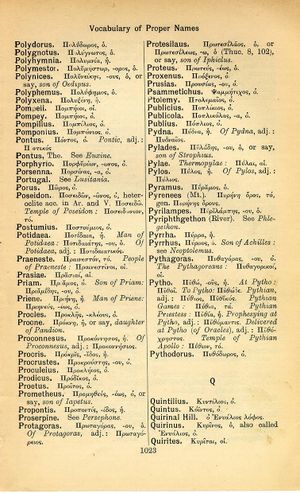Prometheus
ὁ γοῦν Ἀνάγυρός μοι κεκινῆσθαι δοκεῖ → did somebody fart, seems to me the Anagyros has been stirred up, I knew someone was raising a stink, the fat is in the fire
English > Greek (Woodhouse)
Προμηθεύς, -έως, ὁ, or say, son of Iapetus.
Latin > English (Lewis & Short)
Prŏmētheus: (trisyl.), ĕi and ĕos, m., =Προμηθεύς (the Forethinker),
I a son of Iapetus and Clymene, brother of Epimetheus, and father of Deucalion. He formed men of clay, and animated them by means of fire brought from heaven; for which he was fastened to Caucasus, where a vulture, or, as some say, an eagle, fed upon his entrails, until, at last, it was slain by Hercules, Cic. Tusc. 3, 31, 76; Auct. Her. 4, 6, 9; Hor. C. 1, 16, 13; Ov. M. 1, 82; Hyg. Fab. 54; 144; Verg. E. 6, 42; Prop. 3, 3, 29 (4, 4, 7); Mart. 11, 85, 9; Stat. Th. 11, 478; Lact. 2, 10, 5.—Poet., transf., of a skilful potter, Juv. 4, 133.—Hence,
A Prŏmēthēus, a, um, adj., of or belonging to Prometheus, Promethean: juga, i. e. the Caucasus, Prop. 1, 12, 10; also called rupes, Mart. 9, 46, 3: fibra, of Prometheus, Val. Fl. 7, 356: creta, Col. poët. 10, 59: lutum, Mart. 10, 39, 4: cruor, Ov. Am. 2, 16, 40: manus, Stat. Th. 8, 305.—
B Prŏmēthĭădes, ae, m. patron., the son of Prometheus, Deucalion, Ov. M. 1, 390.
Latin > French (Gaffiot 2016)
Prŏmētheūs¹² (trissyll.), ĕī ou ĕos, m. (Προμηθεύς), Prométhée [fils de Japet, frère d’Épiméthée, père de Deucalion, fit l’homme d’argile et l’anima avec le feu du ciel qu’il avait dérobé ; en punition il fut attaché sur le Caucase, où un vautour lui rongeait le foie ; il fut délivré par Hercule] : Cic. Tusc. 3, 76

